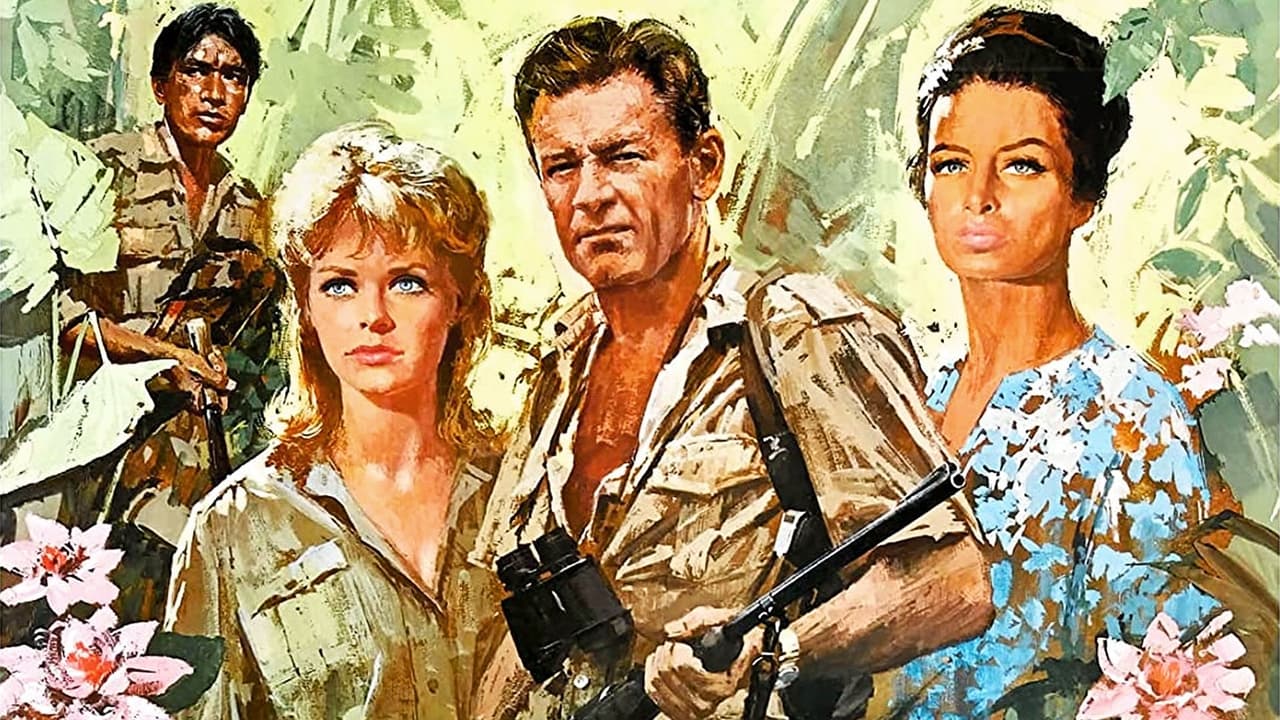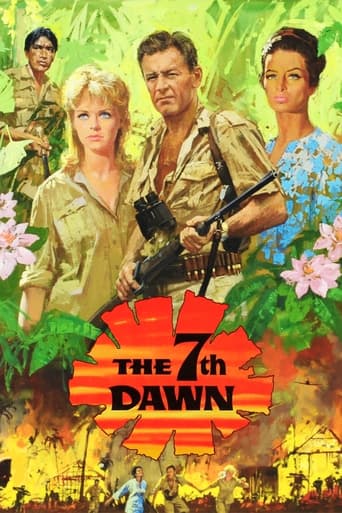

It's sad how little the U.S. has learned from the British Empire that preceded it. But that's the politics and it's somewhat interestingly presented here. The biggest problem with this movie is it opens as a love triangle: Holden/Tambo/Capucino. Before the first scene is over Tambo wander off to become a commie revolutionary and in wanders Susannah Can't Act York. So it's a different love triangle. Except Holden and Capucino aren't in love; they seem to have more of a roommate-with-privileges relationship. A few people get blown up real good. Holden does some dashing things we've already seen in Bridge...Kwai. Snore. This movie is notable for featuring a still-fit Holden, with bags forming under his eyes to show the hard living of the past decade. This might also be the point where he's no longer the cynical individualist with a smile and a wink to the cynical survivor with a bitter smirk. He's closer to the bitter washed-up Pyke of The Wild Bunch at this point. I want some UCLA film student to write his doctoral thesis on Holden's career and life as it played out on the screen. For now I might just have to read Stefanie Powers' book about him.
... View MoreThe 7th Dawn (1964)The best of this movie is an attempt to show the politics of Malaysia after WWII. There are lessons here that apply to our own time, with European powers facing rising anger in developing countries. Here it's the British who are facing horrors from the Malaysians because they own so much of the good land and maintain typical colonial class and monetary power (even though it was no longer an official colony). A little like half the world, I suppose, in mid-Twentieth Century, including South Africa and Vietnam.The movie is stiff and forced in other ways, and often feels like a movie that might have been made a decade earlier. It plays with clichés and uses convenient movie tricks that are false even to the uninitiated. The leading man hasn't that worn well over the years--William Holden. I generally like him, but here I can feel him acting too often. Some of the charming ticks in his face, or his dry delivery, now seems fake and even smarmy, like the letch in him can't hide beneath his acting, or the "leading man" in him is all he has. I have a feeling these quirks were attractive at the time, fifty years ago.It's not a total train wreck of a movie. Susannah York is stunning in a way that avoids the stereotyping she often reluctantly fit into, the Pop British flower-child. Unfortunately York isn't a terrific actress here, and at first is merely the serious woman to put against Holden's character. She does have an important role, but it's extremely limited (you'll see why) and she can be sculptural without pretense. But then next to York is the "other" woman to whom Holden (46 years old here) is attracted (which by itself is absurd, York playing the less desirable woman). This is played by the younger and unconvincing Capucine. (She went by one name, but was born with the usual allotment.) It's not that she's a bad actor really, but that she's a frivolous object with so little awareness of what surrounds here. I'm sure people like her were in Malaysia, but to make her a centerpiece of the movie brings everything down a couple notches.If we can absorb the stilted (at times) style and the improbable aspects in the subplots (Holden with the young tart slashing through the jungle with machetes) we are able to go back to the political facts. The details are fictional, for sure, but the broad outline, the fear of Westerners in a land where they are not at all welcome, is believable. And the film doesn't paint it completely as a bunch of innocent English richies being killed and tormented by the rabble, though there is a little of that. It's more about a the real conflict of histories and ways of life. And a sticking to principles. I think a more potent idea here, without York by this point, is whether personal friendship can hold up through huge differences of culture and loyalty. This might be the best part of the movie, and in those sections you'll at least feel depth to the idea and even the acting, even if the outcome is a bit beside the point. In one later scene the woman at this point (the tart) asks, "How can you believe him?" Exactly! The question of trust in the mind of the audience is obvious to the characters, too, and so it's the final large theme, taking us from the first scene to almost the last.Everything outside shot on location, which adds authenticity not only on the plantations (rubber) but later in the raw jungle. If you watch this you'll find things to like for sure. But it's not constructed very well, and the clunky parts will overwhelm you at times. You'll also find that people who should be freaking out (on death row, or a man seeing his daughter likely to die) calmly proceed instead. Or when someone takes a prisoner after a huge fight, they then let down their guard and trust him to walk away with his weapon.It's too bad. A lot was pointed in the right direction at first. There are more recent movies that take the realism of their periods seriously and to probably better results (blockbusters like "Gandhi" or "The Last Emperor" and more perceptive if imperfect films like "Lust Caution" and the weirdly chilling "Disgrace"). But the theme is really one of the largest in the history of movies, actually, if you start looking at everything from "The Rains Came" to "The Letter" both from the classic black and white Hollywood years. "The 7th Dawn" fits into this picture somewhere.
... View MoreThere is a haunting, lost quality to this film that is really special. The mysterious jungles, ethereal sunrises, lost colonial world are all woven together beautifully. The life-enhancing youth of Susanna York, and exotic Capucine at the peak of her career converge at just the right moment in time to play off of the wasted, weary Holden (though still an effective acting presence). Few viewers at the time realized that the famous globe-trotting Holden was perfectly suited to this role as an aging man who accumulates wealth but realizes that he has thrown away all his opportunities for success in a personal life. Now we know that age and mistakes were catching up with Holden himself, just like the character he portrays here. Expensively made, fine cinematography, beautiful but haunting musical score written at the perfect time.Sincere acting conveys the simplistic ideals believed by everyone in those days (The British, the Communist leader Ng, the naive Americans). Simplistic thought by so many people who did not realize that the world was becoming very complicated. The USA that very year on the brink of massive effort and tragedy in Vietnam. The early 1960's with so many nations on the cusp of independence as colonialism was literally dying as this film was being made. Viewers in 1964 were still expecting movie-star Holden and happy endings. Instead, Holden gave them the truth here and they couldn't handle it. So, this movie was long forgotten, only shown a few times over the years in various chopped-up prints, and achieved obscurity. We are lucky that a full-length version was preserved. This kind of independent-minded, carefully photographed, rare unique movie is seldom encountered and should be treasured, despite how uneven or flawed it may be.
... View More..the terrific opening titles by noted artist Maurice Binder. He is most famous, of course, for the BOND film titles. This movie is indeed overlooked, though I remember seeing it on more than a few occasions on TV. Nowadays older movies don't make it on the tube in the U.S.; at least on regular (commercial-laden) channels.I hope to acquire a copy of this movie someday, either tape or DVD. Format doesn't matter to me. The way old movie stars of this era (40's-50's-60's) are dropping like flies it's important to grab up as much of their work as possible. The up-and-coming generation of movie goers probably won't demand this kind of material unless they get a chance to view it.
... View More